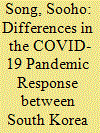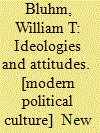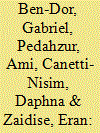|
|
|
Sort Order |
|
|
|
Items / Page
|
|
|
|
|
|
|
| Srl | Item |
| 1 |
ID:
189471


|
|
|
|
|
| Summary/Abstract |
The impact of the COVID-19 pandemic has varied across countries. Some countries controlled the virus relatively well, while others did not. In the United States, almost a million people died. However, South Korea’s death toll is only about 12,000 even though its population is about one-sixth of the United States. What caused the difference? We argue that public compliance to government direction is the primary reason. South Korea’s collective culture valuing communal benefits helped the people conform to government directions, such as mask wearing in public places. By contrast, American people resisted the government policies that restrict individual freedom due to the individualistic culture. In South Korea, historical experiences of relatively frequent national crises led to the rise of defensive nationalism, resulting in national union. However, the United States had relatively fewer national crises, and thus nationalism did not rise. Instead, national division, xenophobia, and hatred toward Asians prevailed in the United States. Besides the cultural differences, differences in national leader’s characteristics, past experiences of public health crisis, and political system also contributed to the different outcomes of the crisis.
|
|
|
|
|
|
|
|
|
|
|
|
|
|
|
|
| 2 |
ID:
045099


|
|
|
|
|
| Publication |
New Jersey, Prentice-Hall, 1974.
|
| Description |
xiv, 385p.
|
| Standard Number |
0134495209
|
|
|
|
|
|
|
|
|
|
|
|
Copies: C:1/I:0,R:0,Q:0
Circulation
| Accession# | Call# | Current Location | Status | Policy | Location |
| 013426 | 320.5/BLU 013426 | Main | On Shelf | General | |
|
|
|
|
| 3 |
ID:
187760


|
|
|
|
|
| Summary/Abstract |
In this article, I argue that the so-called ‘intifada of knives’ in 2015–2016 was not a new phenomenon in the Palestinian resistance. Instead, it paralleled the situation in Gaza in the mid-1980s when Palestinian Islamic Jihad (PIJ) members engaged in similar attacks. What both periods share is the absence of efficient organisational vehicles facilitating a more durable form of collective resistance. This was the case in the mid-1980s because PIJ was yet to develop the effective organisational structures required to facilitate the resistance its members desired, and this was also the case in 2015–2016 because Palestinian youth are largely disillusioned with Palestinian political factions and traditional party politics as arenas to implement change. As these and similar outbursts of violence offer few, or no, principles for political organising for those who follow, what marked the wave of stabbings in the mid-2010s was not the fury with which they were carried out, but rather the rapidity of their collapse. I thus argue that certain organisational principles are required to sustain and prolong any popular protests for a sufficient period.
|
|
|
|
|
|
|
|
|
|
|
|
|
|
|
|
| 4 |
ID:
122525


|
|
|
|
|
| Publication |
2013.
|
| Summary/Abstract |
A product of science, religion, and national culture, cosmism is reflected in academic and popular views about our place in the universe, space exploration, and human destiny. Although linked historically to the Russians, cosmism captures many aspects of American thinking about space. The present comparison shows that prophets, prophecies, striving for perfection, utopian visions, and hopes for salvation are evident in both Russian and American thought, but that there are also differences. Geert Hofstede's cross-cultural research on national values-power distance, individualism, masculinity, and uncertainty avoidance-is useful for understanding Russian-American differences. Russian acceptance of power inequalities, collectivism, concern for group welfare, and aversion to uncertainty lead to constellations of beliefs and emotions about spaceflight that differ from those bred by American egalitarianism, individualism, obsession with personal achievement, and acceptance of uncertainty. Both Russian and American thinking include occult and paranormal phenomena, but Americans have been more reluctant to assimilate such influences within mainstream science. As a concept, American cosmism captures the occasional blurring of the lines between religion and science in discussions of humanity's place in the universe and future in space.
|
|
|
|
|
|
|
|
|
|
|
|
|
|
|
|
| 5 |
ID:
023931


|
|
|
|
|
| Publication |
Cambridge, Cambridge University Press, 1988.
|
| Description |
vi, 232p.
|
| Standard Number |
052132548X
|
|
|
|
|
|
|
|
|
|
|
|
Copies: C:1/I:0,R:0,Q:0
Circulation
| Accession# | Call# | Current Location | Status | Policy | Location |
| 029299 | 306.2/BIR 029299 | Main | On Shelf | General | |
|
|
|
|
| 6 |
ID:
044384


|
|
|
|
|
| Publication |
Cambridge, Cambridge University Press, 1988.
|
| Description |
vi, 232p.
|
| Standard Number |
052132548X
|
|
|
|
|
|
|
|
|
|
|
|
Copies: C:1/I:0,R:0,Q:0
Circulation
| Accession# | Call# | Current Location | Status | Policy | Location |
| 029346 | 320.1094/BIR 029346 | Main | On Shelf | General | |
|
|
|
|
| 7 |
ID:
082695


|
|
|
|
|
| Publication |
2008.
|
| Summary/Abstract |
This study examines conditions of peace and war to find whether the "rally `round the flag" effect is indeed attributed to rising levels of social collectivism. Reserve service motivation in peacetime and wartime was compared among 1,004 Israeli reservists. Levels of motivation and the factors that affect them were examined during the optimism of the Israeli-Palestinian peace process (February 2000) and about a year and a half into the second Intifada (October 2000). Findings suggest that motivation to serve in wartime is indeed higher than in peacetime. However, they also suggest that similar factors predict motivation in both times, although their relative impact is altered by the situation. Reservists were more likely to be motivated by individual rather than collective incentives (in both peacetime and wartime situations), thus suggesting that "rally `round the flag" occurrences are not necessarily reflective of the social cohesion and collective reasoning.
|
|
|
|
|
|
|
|
|
|
|
|
|
|
|
|
|
|
|
|
|